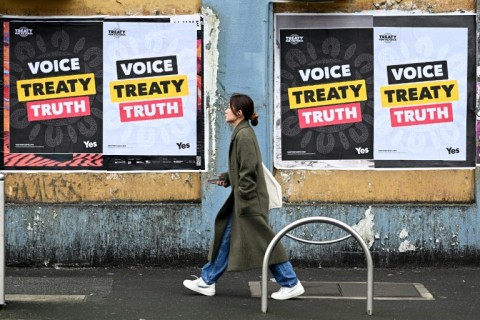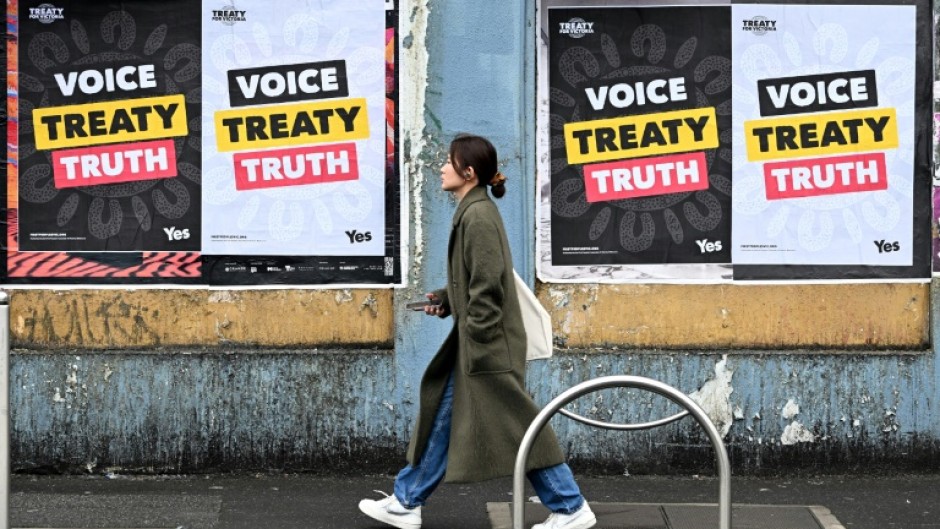SYDNEY - A referendum aimed at elevating the rights of Indigenous Australians has instead triggered a torrent of racist slurs and abuse, with toxic debate spreading online and in the media.
The October 14 vote will decide whether to finally recognise First Nations peoples in the constitution.
Their ancestors were in Australia for 60,000 years before British colonial rule began in the late 1700s.
The reform would give Indigenous communities the right to advise parliament -- a so-called "Voice" -- to help address entrenched inequalities including poorer health, weaker education, and higher rates of incarceration.
But recent surveys indicate support for the referendum has plummeted over the past year and will likely fail.
The debate has stirred uncertainty about the reform's scope and impact. It has also stoked racial tensions.
"It has involved personal attacks, labelling of people as 'un-Australian' and perpetuating racially based stereotypes," Australia's Race Discrimination Commissioner Chin Tan told AFP.
"I am disappointed that the way some people have engaged in the debate has stoked racial tensions and caused harm to First Nations peoples."
Racist conduct had gone largely unchallenged in the public domain, he said.
"Racism should never be accepted as part of the exchange of ideas in public debate."
Voters have to choose one way or the other, and recent surveys indicate the "yes" camp is at just over 40 percent and the "no" side at nearly 60 percent.
It is a near reversal of the situation a year ago.
Opponents have criticised the proposal for a lack of detail and for creating unnecessary bureaucracy.
But opposition leader Peter Dutton, one of the leading campaigners against the Voice, also warned it would "re-racialise" Australia.
Referendum supporters accused Dutton of disinformation and scare-mongering.
- 'Catastrophic breakdown' -
Indigenous-related racism reports have spiked since July, according to University of Technology Sydney criminology professor Chris Cunneen, who leads a project that documents such incidents.
The share of racism complaints in the "Call It Out" register related to the referendum had climbed to about 30 percent since July, he said.
In previous months, the rate was eight percent.
"We have also seen an increase in reports of racism online on social media and in the media during the same period," Cunneen said.
"Combined these make roughly more than half of all reports."
A national mental health helpline for First Nations peoples, 13YARN, painted a similar picture.
It recorded a 108-percent increase in callers reporting abuse, racism and trauma from March-June compared to a year earlier, a spokesperson said.
University of Queensland communications professor Timothy Graham examined thousands of Voice-related posts on X, formerly Twitter.
He found a "catastrophic breakdown of public communication about the referendum across the entire Australian media ecology".
"X/Twitter is overrun with confusion, misinformation, and incivility -- this occurs in what can only be described as a vicious feedback loop between politicians, partisan media, and social media," he told AFP.
- Online abuse -
Samala Cronin, an Indigenous woman of Butchulla heritage in Queensland, knows how it feels.
In August, an old video of her went viral.
It showed her in a heated row with an elderly couple about a parcel of land over which Aboriginal people have "exclusive native title".
"I got about 3,000 notifications from Facebook and I thought: 'Oh my God'," she told AFP at the time. It has since racked up thousands more reactions on the platform.

The comments were littered with racist insults.
The country's online safety watchdog, the eSafety Commission, said it had recorded a small but noticeable rise in the proportion of adult cyber abuse complaints from First Nations people in the first half of this year.
"We're also hearing from community stakeholders that online abuse is ratcheting up as we approach the referendum," eSafety Commissioner Julie Inman Grant told AFP.
She urged all Australians to "discuss and debate this issue respectfully, without stooping to slurs, racist remarks, hate speech or abuse".
kt/djw/kma/ser
By Kate Tan

